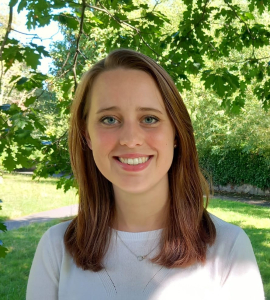Working Towards a Better Future: Emotional Regimes and Feminist Campaigns Around Women’s Work in 1980s West Germany
Katherine Calvert’s research interests encompass twentieth- and twenty-first-century German cultural history, the history of emotions, the German women’s movements, and print media.
During her stay at the ZZF she will study the language of emotion in print media texts on the subject of women’s work in the Federal Republic of Germany in the 1980s. Political cultural production, including print media, both reflects the society within which it is produced and acts as a means for writers to shape public discourses. Katherine’s research treats print media as a creative space in which political agents can explore, embed, or resist normative and gendered emotional regimes. By comparing print media accounts of women’s paid employment and unpaid work in both domestic and political settings, her project will consider the extent to which feminists present different forms of work as a path towards or a barrier to emotional well-being. This work will shed light on the ways in which feminists understood, expressed, and sought to mobilise emotions in relation to their political work. Katherine’s project adopts an interdisciplinary methodology, combining approaches from the history of emotions and cultural studies, building in particular on work that has revealed the stake that political movements have in influencing feelings. This analytic framework recentres the experiences and voices of individuals within collective movements and develops the idea of emotional freedom as the possibility of defying normative emotional regimes.
The research that Katherine will carry out at the ZZF forms part of a larger project that analyses feminist non-fiction writing, including political essays, pamphlets, newspapers, and magazines, from around 1970 to the present day to examine the role of emotions in motivating or inhibiting women’s political participation. This research aims to deepen our cultural historical knowledge of the connections between German political movements and discourses of emotion as well as our understanding of the upsurge in emotionally laden political communications in today’s world.
During her stay at the ZZF Dr. Katherine Calvert researches in Department IV: Regimes of the Social Sphere.
